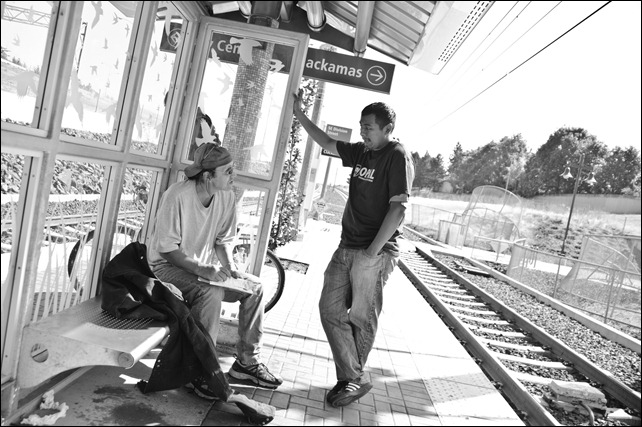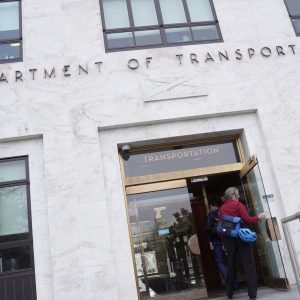
in 2010, gathering support for what became a
successful campaign for longer-lasting transit tickets.
(Photo: Michael Schoenholtz/Portland Afoot)
On March 1, the lifespan of a TriMet ticket will rise 25 percent.
Raising the transfer duration from two hours to two and a half hours is effectively a price cut for anyone who takes round trips on the Portland region’s transit system one ticket at a time — either because they’re only an occasional rider or because they don’t have the cash or fancy job to have a monthly pass.
It’s also the clearest win so far for the five-year-old Bus Riders Unite campaign from local advocacy group OPAL Environmental Justice Oregon. Their “Campaign for a Fair Transfer” emerged from meetings in 2010 that asked East Portland transit riders what changes would make a difference in their lives.
Lower fares, many riders said, and more frequent buses. OPAL has since spent years pushing for both, with mixed success.
But a somewhat smaller idea that emerged from those meetings was the idea of a longer transfer — long enough to get from outer Southeast Portland to a Battle Ground construction worksite. Long enough to take the family to a movie and return without paying twice.
The organization shopped that idea around to potential allies like Chris Smith, a city planning commissioner, transit commentator and Portland Streetcar board member.
“He looked at me and said, that is a fight you could win,” former OPAL organizer Shannon Olive told me in a 2010 interview.
Advertisement
OPAL’s members and organizers agreed. They started riding the bus every week to gather names of riders who wanted to take action. The recruits they found there and elsewhere became the core members of Portland’s most interesting and well-organized group of public transit advocates.
OPAL asked the agency for a universal three-hour ticket, plus all-night lifespans for any ticket purchased after 7 p.m. Over the next few years, TriMet seemed to sometimes dismiss, then favor, then back away from taking action.
Now that rebounding payroll tax income has let TriMet restore most of its service hours and built a new $1.5 billion MAX line — but continued to grapple with stagnant ridership significant drops in public perceptions of its quality — the agency seems willing to start taking risks. One of them, it announced on Wednesday, is extending the life of a transit fare.
TriMet, drawing on an economist’s report that anticipated little change in rider behavior, thinks the agency will lose $1.2 million a year from lost return fares out of its $342 million operating budget. OPAL, drawing on its own estimates with different assumptions about riders’ price sensitivity, disagrees.
“We think that in a matter of a few years it will pay for itself,” Jonathan Ostar, OPAL’s executive director, told the Portland Mercury on Wednesday. “For once we actually saw the board take a risk to the benefit of riders.”
Whatever happens, it looks as if we’ll get to find out.







Thanks for reading.
BikePortland has served this community with independent community journalism since 2005. We rely on subscriptions from readers like you to survive. Your financial support is vital in keeping this valuable resource alive and well.
Please subscribe today to strengthen and expand our work.
Still grappling with stagnant ridership? Allow me to point you to the astronomical price of a 2 / 2.5 hour ticket. It costs me roughly $1.10 in gas to drive into Portland ( 10 mile trip ). If I take the bus, the same trip costs me $2.50. There is absolutely no way to justify paying that much for a bus ride.
Wear and tear costs range from 25 to 50 cents a mile.
56 cents in the IRS business mileage rate… 23.5 cents for medical/moving…
Yes but that wear and tear isn’t 25 to 50 cents per mile per each rider.
I always find the real cost is parking. But if you’re going somewhere where parking is free, then driving is probably more cost efficient.
Even downtown, street parking is very cheap in Portland.
Not to mention the awful deal most passes are. Unless you ride twice a day, 5+ days a week, nearly every pass they offer is actually more expensive than just buying individual tickets. But then you’re faced with doing the math for every single trip, you start contemplating the time and hassle, and it becomes a lot easier to say “$*&# it, I’m just going to drive”.
I say pass the street fee, but include a free TriMet pass for everybody that pays into it. Then you might actually see ridership go up, especially multi-modal users, and that could lead to some positive changes in the system.
This will be one of the big improvements in the new efare system. Much like the Oyster card in London, you will be able to buy single tickets, and once you’ve spent as much as a day / monthly pass, the fare is capped.
I justify it every day… stress relief is worth way more than $2.50… I don’t choose my transportation based only on cost… cost usually never even factors in. I look at distance, cargo needs, weather, route, destination amenities, time, etc…
I will make time and pay a little more for the option of not being forced to drive and all the stress that’s involved with it…
I don’t find driving particularly stressful. It’s certainly not as fun as riding the bike into town. But anyone that tries to tell you that sitting in a chair for 30 minutes is ‘stressful’ or ‘terrible’ has a serious case of first-world-problems syndrome.
Standing at the bus stop when the bus is late, wondering if it’s ever going to come, wondering if there’s a service outage, now that’s my idea of a bad morning.
Portland
Don’t you have a smartphone? The real time information from TriMet is quite good.
For me it’s not only the price, but the time. I can bike downtown in 25-30 minutes from my house. The bus is a minimum of 45 minutes with no traffic.
About time! I have felt that the 2-hour time limit is not long enough to get stuff done, and get back. Sometimes when I do estimates, I take the bus, and find that I have to pay for another $2.50 fare, especially when I have to make a transfer.
Is that the purpose of a transfer though? I know some people use it as such, but aren’t you really supposed to be paying for two trips (there and back)?
I mean the definition of “transfer” is that you would get on a connecting bus to get where you are going, not make full round trip not he same bus line.
Free/cheap parking is the enemy of Transit/Alternative Transportation
As is the recent plummeting gas prices.
If one qualifies for an H pass, at $26/month it is the best deal going!
As a daily bike commuter I rarely ride Trimet anymore, but a recent experience with the $2.50 fare struck me as excessive for close-in riders.
Back in the days of multiple (3 then 5?) Trimet zones, suburban riders paid something more in relation to the greater distances they were riding. There seemed to be some proportionality in the fare structure relative to the distance traveled. With the not-so-new unifare, close-in or short hop riders are paying the same fare for a 3-4 mile trip as someone commuting 15 or more miles. While that’s great for that long distance commuter, the in-town fare felt excessive.
I could imagine that the longer transfer time period could actually boost revenue for Trimet because a $2.50 fare for a short round trip becomes competitive with the appearance of the cost of driving.
Broken fare machines (estimated to be “down” about 10 percent of the time) combined with the fare inspectors “no excuses” stance and the fine of close to $200 caused me to abandon Trimet for all but the most dire emergency. I realize the fare machine is not an issue for those riding the bus, but the Max was my alternative option for my work trips.
The new smartphone app makes the fare machines redundant (thankfully). Assuming you have a smartphone, of course.
I love the app, but it, too, can be unreliable. I’ve had it fail on me in a rush situation more than once. Connectivity and coverage issues, I think. Generally, though, I agree: it’s a huge boon to occasional riders.
Yeah. I had an issue one time when the app was loading real, real slow, and the bus driver almost refused it because the image wasn’t “moving” fast enough. (If you haven’t seen the app, the “ticket” image features a scrolling/looping background.) Haven’t had that issue since they released an update, but it made me wary of using the app for a bit.
10+. For TriMet, I have always seen this as a money making scheme. How is it that a public transportation agency can charge $175? It is criminal.
because making the fine $30 isn’t likely to act as much of a deterrent. The agency is not the one illegally riding the train.
Don’t grocery stores still sell 10 packs of TriMet passes? Just keep one or two in your wallet, and you’re set for a rush or emergency.
I know this requires some planning ahead, but works pretty well if you can remember.
Wear and tear costs are ambiguous here. If you had to purchase and maintain a car just to commute, then sure, depreciation, repairs, insurance, could be factored in. But that’s not the case, it was bought long ago to get out of town on weekends, take the dog on camping trips, etc. So on days the bike isn’t ridden to work, the car is already in the driveway, and it only asks for half the money that Trimet does.
Maybe if parking weren’t free, but for some strange reason, Portland doesn’t charge me for parking.
Thank you, OPAL. This was a long time coming and it will benefit a lot of people who really need it.
OPAL really hung in there and played the game like real pro’s even tho the Trimet technocrats INTENTIONALLY abused their power and delayed this as long as they could get away with.
The bad news: TRIMET HAS FARE INCREASES COMING NEXT SEPTEMBER
Great article and great news!
Only one quibble – I think you may have deleted a reference higher-up in the article giving the full name and role of Jonathan Ostar, OPAL’s Exec. Director. Penultimate paragraph leaves one hanging without it.
thanks el timito, I’ve added that back into the story.
there’s a bus to Battle Ground? c-tran only goes to Brush Prairie…
2.5 hours enough to get to a movie and back? good luck with that… maybe if it’s a short movie and you have no transfers to make… and the buses are timed right with when you need to leave/return around the movie show time… but not something I’d bet money on…
C-Tran bus 7, the Battle Ground line, goes to…Battle Ground.
It’s southern terminus is Vancouver Mall. So coming from Portland, one would still need to take a C-Tran bus to Vancouver Mall first.
Yeah, that “return from the movie” use case was more plausible with their original request (3 hours/all night after 7) than the 2.5 hours TriMet was willing to give.
I stopped getting 1-day passes when they made it the same price as 2 of the 2-hour passes…
if I’m running errands then maybe I’ll make it back before 2 hours…
if I’m commuting maybe somebody will want to give me a ride to happy hour and then home… or I don’t want to wait 30 minutes for the bus and I use Car2Go…
I also stopped getting 1-month passes when I had to pay full price, because as dave mentioned above if you miss 1 or 2 days then you’re overpaying… then factor is coworkers giving you a ride sometimes and you’re losing money with a 1-month pass…
I’m just wearing out the TriMet printers with extra unneeded transfers caused by their pricing…
bottom line: 1-day and 1-month passes should be good deals, not just a convenience to breaking even and saving paper/ink…
Absolutely! Opal was trying to get the 2 hour tickets turned into a 3 hour, sort-of-day-pass for people to run errrands and make short trips. That’s OK, but really Trimet should be pricing day passes and monthly passes so that the vast majority of frequent bus users buy a monthly (or annual) pass, and the majority of occasional riders buy a day pass. This saves lots of time at bus stops by reducing the time lost while people search for exact change.
Why is TriMet getting kudos for this? They should have extended the transfers to 3 hours.
Yawn. I mean, sure, it is a token gesture of kindness to transit users, AKA “Choice Riders” (TriMets own term). However, 2.5 hours is still NOT enough for riders who live past 82nd or in WA county, especially during the weekend. I live in WA county and it takes forever to just get into downtown Portland. MAX frequently is 5-20 minutes late, causing me to miss my bus connection, which then has me waiting up to 30 minutes. I got so fed up with TriMet, that after being carfree 18 years, I finally broke down and bought a brand new Honda Fit in cash. It was the best purchase of my life, besides my Co-Motion 😉 now I am from home to office in 30-40 mins Vs. 1.5 hours. I no longer have to be a “Choice Rider” at an unsheltered bus stop, in the wind and rain, frantically texting StopID numbers to find out where the heck my bus went. I no longer have to deal with an CRAMMED train at rush hour…you know what? I hope TriMEt improves, a fast. If it was more reliable and frequent (a train every 5 mins during rush hour) I may just leave my car at home some days!
Although I appreciate the idea of OPAL advocating for transit riders, this 2.5 hour transfer would’ve been authorized by the TriMet board almost a year ago if OPAL hadn’t sued TriMet for not conducting a “transit equity” analysis on the ticket printers onboard buses that provide uniform transfers on printed tickets. Because of the lawsuit, TriMet couldn’t extend the fares without getting confirmation from the feds that a “transit equity” analysis had to be performed for the ticket printers and another one for the transfer extension. The result of which was extended delays in order to prepare the analyses and have the feds approve them.
Most truly low-income riders have access to discounted passes through social programs, and the agency is practically giving away honored citizen cards from what I’ve seen. Sure, the 2.5 hour transfer is a “nice to have”, but it’s hardly the victory OPAL makes it out to be and would’ve been done sooner if OPAL was a little smarter about their interactions with Trimet.
Comment like this crack me but a bit. Let’s not forget that this extension would have NEVER happened if not for the tireless community organizing and advocacy of OPAL/BRU. To blame them because it didn’t happy sooner, when it wouldn’t have happened at all without them, is a bit ridiculous.
And if you still think it’s worth minimizing the victory because of the delay, well, maybe that’s because few people fully appreciate how long and hard OPAL/BRU worked with TriMet to try and avoid filing the complaint (it’s not a lawsuit) to the FTA (it was filed the day before the statute of limitations ran out). But the agency continued to ignore them. And then absolutely nothing in the complaint prevented the agency from moving ahead with the transfer extension – except it would have suggested TriMet’s position against OPAL/BRU was wrong.
And ultimately, that complaint resulted in new national legal precedent that increases civil rights protections for transit riders. And this precedent is already having a pretty major impact on TriMet’s plans to roll out a new electronic fare system. So… yeah…